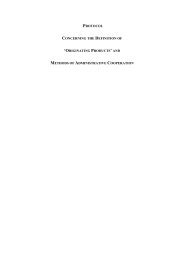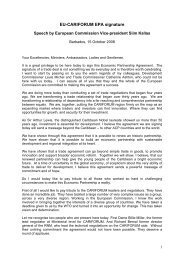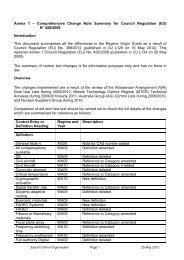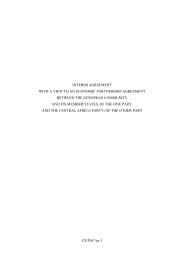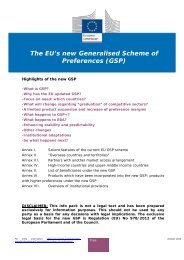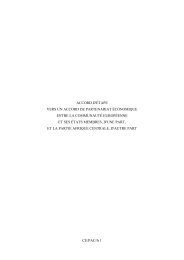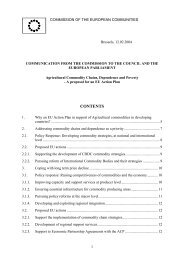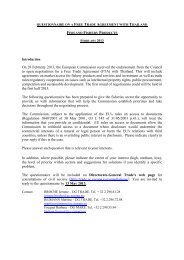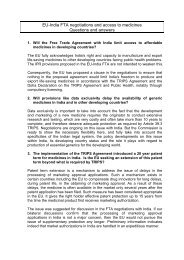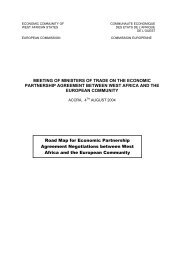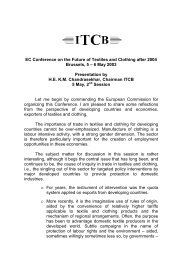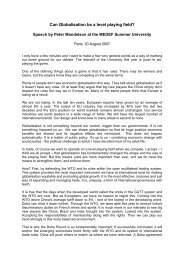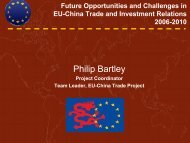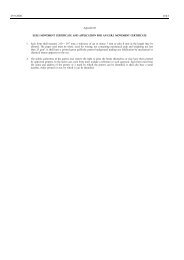Report on the Implementation of the derogation to ... - Trade Websites
Report on the Implementation of the derogation to ... - Trade Websites
Report on the Implementation of the derogation to ... - Trade Websites
You also want an ePaper? Increase the reach of your titles
YUMPU automatically turns print PDFs into web optimized ePapers that Google loves.
Final <str<strong>on</strong>g>Report</str<strong>on</strong>g><br />
RoO Derogati<strong>on</strong> under <strong>the</strong> PACP-IEPA<br />
not least because it does not yet have commercial ties with <strong>the</strong> major EU brands, which as shown in<br />
Secti<strong>on</strong> 6.1 play a central role in <strong>the</strong> EU market. 306 The Oceanic Développement assessment<br />
identified <strong>the</strong> most likely impact <strong>of</strong> <strong>the</strong> derogati<strong>on</strong> as being a diversi<strong>on</strong> <strong>of</strong> raw material supply from<br />
processors reliant <strong>on</strong> catch from <strong>the</strong> WCPO, especially Thailand and <strong>the</strong> Philippines. The c<strong>on</strong>sultants’<br />
research findings from this review c<strong>on</strong>cur with this general assessment.<br />
The sec<strong>on</strong>d, more recent, study was commissi<strong>on</strong>ed by EUROTHON. Sullivan et al. (2011), found that:<br />
‘it is not possible <strong>to</strong> identify global sourcing as <strong>the</strong> immediate cause <strong>of</strong> processing declines in <strong>the</strong> EU’;<br />
‘global sourcing in PNG is not a more immediate threat <strong>to</strong> <strong>the</strong> EU processing sec<strong>to</strong>r than <strong>the</strong><br />
numerous c<strong>on</strong>straints that it already faces from global competi<strong>to</strong>rs’; ‘PNG processors might be more<br />
competitive in loining, than in canning, though in <strong>the</strong> l<strong>on</strong>g term’ canning might become more viable<br />
307<br />
‘if PNG producti<strong>on</strong> costs improve’. The ‘l<strong>on</strong>g term’ was not defined. The <strong>on</strong>ly major medium-term<br />
threat indentified by Sullivan et al. (2011) is if <strong>the</strong> derogati<strong>on</strong> is seen as a precedent ra<strong>the</strong>r than as<br />
an excepti<strong>on</strong> (see discussi<strong>on</strong> in Secti<strong>on</strong> 2).<br />
The following attempts <strong>to</strong> deepen <strong>the</strong>se analyses. It draws heavily <strong>on</strong> projecti<strong>on</strong>s <strong>of</strong> potential PNG<br />
exports using <strong>the</strong> producti<strong>on</strong> plans for 2016 <strong>of</strong> all known current and future processors investing in<br />
PNG (as defined in Table 3.13). It combines this with c<strong>on</strong>textual analyses <strong>of</strong> market and industry<br />
dynamics <strong>to</strong> assess <strong>the</strong> current and medium term impacts <strong>of</strong> <strong>the</strong> derogati<strong>on</strong>.<br />
Caveats<br />
It is important <strong>to</strong> emphasize a series <strong>of</strong> caveats that limit <strong>the</strong> reliability <strong>of</strong> any projecti<strong>on</strong>s <strong>of</strong> <strong>the</strong><br />
impact <strong>of</strong> <strong>the</strong> derogati<strong>on</strong> <strong>on</strong> EU markets, <strong>the</strong> EU DWF, EU-based processors and third countries<br />
exporting canned tuna <strong>to</strong> <strong>the</strong> EU (and <strong>the</strong> relati<strong>on</strong>s am<strong>on</strong>g <strong>the</strong>m all). The following are c<strong>on</strong>sidered <strong>to</strong><br />
be <strong>of</strong> particular importance:<br />
• The situati<strong>on</strong> <strong>of</strong> global tuna catch is open <strong>to</strong> c<strong>on</strong>siderable uncertainty. This includes:<br />
o<br />
o<br />
o<br />
o<br />
Direct anthropogenic effects <strong>on</strong> s<strong>to</strong>cks such as potential overfishing, especially<br />
yellowfin, and <strong>the</strong> widely acknowledged limitati<strong>on</strong>s <strong>on</strong> all tuna RFMOs <strong>of</strong> adequately<br />
managing <strong>the</strong>se s<strong>to</strong>cks.<br />
Indirect anthropogenic effects <strong>on</strong> s<strong>to</strong>cks such as ocean acidificati<strong>on</strong> and global<br />
warming.<br />
Cyclical El Niño and La Niña events affecting tuna, including <strong>the</strong>ir habits and prey.<br />
Intensified global competiti<strong>on</strong> for all natural resources, including tuna, and its<br />
potential manifestati<strong>on</strong>s in <strong>the</strong> strategies <strong>of</strong> firms and <strong>of</strong> governments, which may<br />
result in changing priorities in <strong>the</strong> producti<strong>on</strong> and directi<strong>on</strong> <strong>of</strong> c<strong>on</strong>sumpti<strong>on</strong> <strong>of</strong> tuna.<br />
o The incidence <strong>of</strong> piracy in <strong>the</strong> Western Indian Ocean c<strong>on</strong>tinues <strong>to</strong> disrupt EU DWF<br />
operati<strong>on</strong>s <strong>the</strong>re.<br />
• Rapid and unpredicted downward shifts in extra-EU imports in 2009 and 2010 (see Secti<strong>on</strong><br />
6.1).<br />
• A rapidly changing world ec<strong>on</strong>omy, typified by a global slump in <strong>the</strong> OECD countries and<br />
elsewhere, which makes tuna industry dynamics very difficult <strong>to</strong> predict.<br />
• Changing domestic dynamics in major locati<strong>on</strong>s <strong>of</strong> producti<strong>on</strong>, including civil unrest, wider<br />
political change and natural disasters.<br />
306 Oceanic Développement 2010: 120.<br />
307 Sullivan et al. 2011: 18-19 (emphasis added).<br />
Linpico s.a.r.l. Page 149



